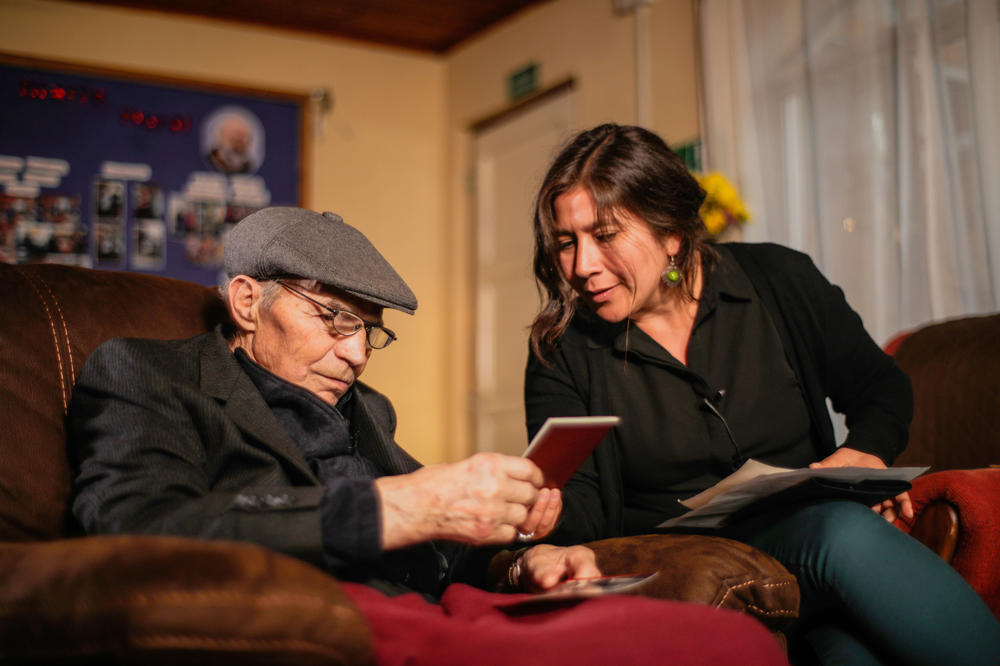A Classic German Hell in Chile
Freie Universität Berlin is developing an audiovisual archive of biographical interviews about the decades of crimes committed in the German settlement of Colonia Dignidad in Chile.
Oct 08, 2019
Remembrance work: Former political prisoner Mile Mavroski is interviewed by Evelyn Hevia of the archive team.
Image Credit: Colonia Dignidad Oral History Archive (CDOH)
In the German settlement of Colonia Dignidad, in the south of Chile, children were sexually abused and opponents of the Pinochet regime tortured and murdered. The crimes went on for decades. In cooperation with Chilean partners, Freie Universität Berlin is currently developing a digital oral history archive: More than 50 contemporary witnesses talk about their personal life stories, which can help to reconstruct the crimes committed.
In 1961, when the police in the German city of Siegburg launched an investigation of allegations of child abuse, Paul Schäfer, a youth welfare worker and lay preacher, fled to Chile. Many of his followers voluntarily joined him not long afterward. One hundred fifty children of sect members were taken to Chile under legally dubious circumstances. Schäfer, an evangelist, promised his followers a traditional Christian life in a promised land.
Instead, they found hell on earth. On a remote farmstead, Schäfer created a small-scale totalitarian dictatorship, which soon came to be known as “Colonia Dignidad” (“Dignity Colony”). Everyday life was marked by slavish toil in the fields, constant surveillance, and psychological and physical violence.
Schäfer raped young boys daily for more than 40 years. The secret police under Chilean dictator Augusto Pinochet was given access to the grounds starting in the 1970s. Dissidents were tortured and killed inside a root cellar.
“The process of investigating these crimes dragged on for years with little progress,” says Stefan Rinke, a professor of Latin American history at the Institute for Latin American Studies at Freie Universität. In 2006, a Chilean court convicted Schäfer of sexually abusing children and sentenced him to 20 years in prison. He died in prison four years later, at the age of 88. “We are still in the early stages of tracing the exact events that took place,” Rinke says. “For example, we need to clarify who knew and helped to make these atrocities possible.”
In cooperation with Universidad Alberto Hurtado, in Santiago, and Universidad Católica del Maule, in the city of Talca, Freie Universität is now developing a project titled “Colonia Dignidad – A Chilean-German Oral History Archive.”
Financed by the German Federal Foreign Office on behalf of the German parliament, the project will spend three years creating an Internet portal where contemporary witnesses are invited to shed light on the colony’s history based on their personal experiences. The researchers are conducting video interviews with about 50 people in Germany and Chile and will be doing scholarly work with these materials.
“Our goal is to give many people an opportunity to talk about these events,” says Rinke. “They are invited to tell about what they remember – however they personally think is best, and in as much detail as they feel is right.”
The research team headed by Stefan Rinke, Philipp Kandler, Dorothee Wein, and Cord Pagenstecher will be speaking with former colony residents and with victims of torture perpetrated by the Pinochet regime, lawyers, journalists, activists, and police officers. In this way, the project will create a virtual space for remembrance, offering a wide range of different perspectives on this chapter in history.
Pagenstecher, who works at the Center for Digital Systems (CeDiS) at Freie Universität, is responsible for the technical development and implementation of the project. “We are developing a digital research environment,” says Pagenstecher, who holds a doctorate in history.
“We are collecting and exploring audiovisual research data and then making them available for future research and teaching activities.” All of the interviews will be transcribed, translated, and time-coded. After that, it will be possible to use the videos like a digital text, searching and organizing them in Spanish and German, either in full text or using various filter settings. “Working with videos makes it possible to do completely different research than with texts,” Pagenstecher says. “You can also take nonverbal expressions into consideration. Gestures and facial expressions, pauses when speaking, or silences.”
The project came about through a resolution of the German Bundestag. Germany officially pledged to support the ongoing investigations, provide funding for projects focusing on remembrance and dialogue, and help affected individuals.
“This is a hugely important signal,” says Rinke. “Germany was blind to this for decades.” Especially among German expatriates, he says, there was more interest in propagating a flawless image than in investigating. “There was a façade that people kept up outwardly,” Rinke says. “Competence, cleanliness, and tidiness – Colonia Dignidad presented itself as a little piece of Germany.”
This text originally appeared in German on September 26, 2019, in the Tagesspiegel newspaper supplement published by Freie Universität.

